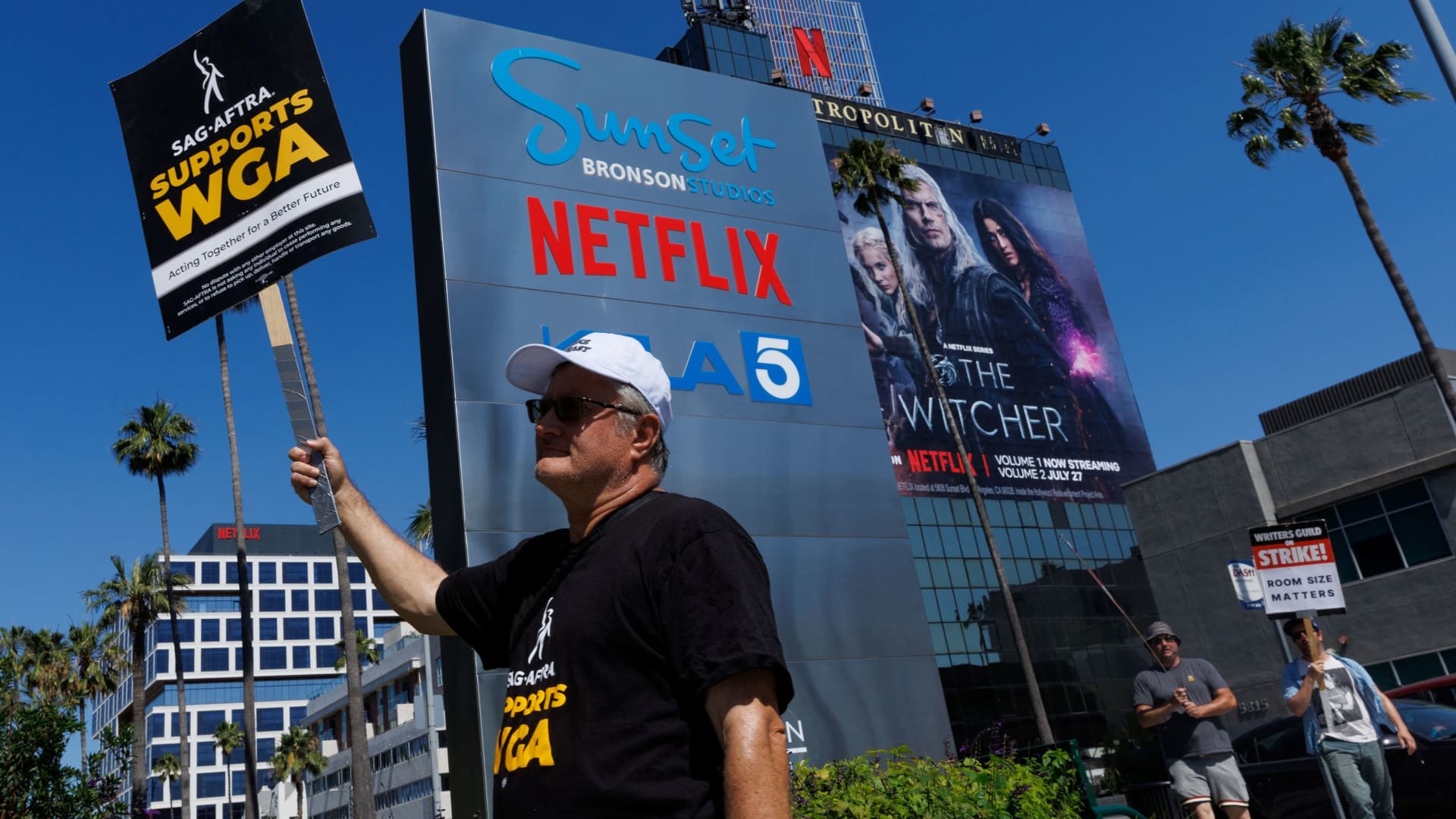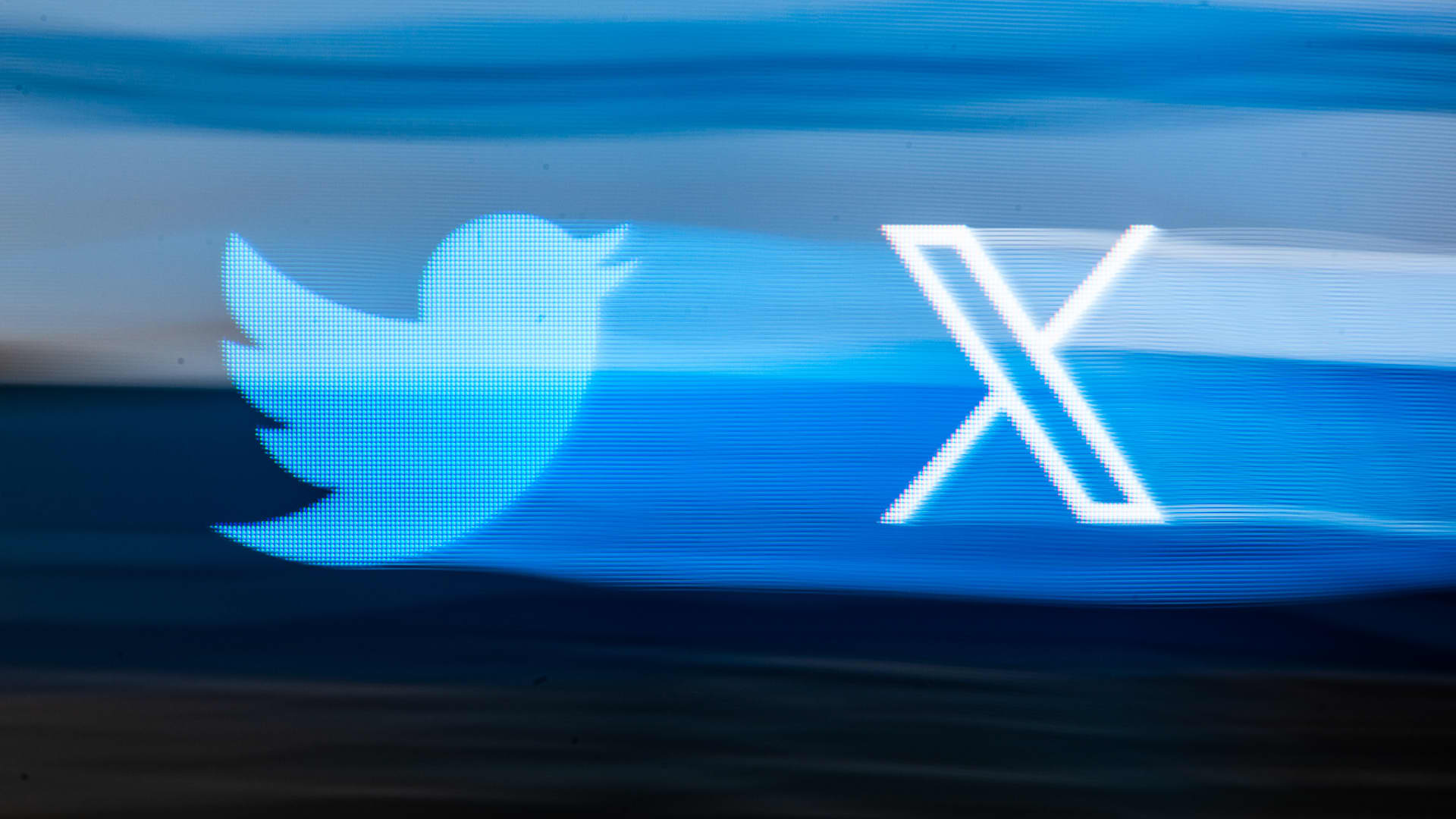Strikes, broadcast losses, advertising decline

Members of the Striking Writers Guild of America (WGA) picket outside the offices of Netflix as the SAG-AFTRA union announced it had agreed to the Alliance of Motion Picture and Television Producers’ “final request” for federal mediation, but it refused to renew its existing labor contract again after negotiations expired at 11:59 PM on Wednesday, Los Angeles, CA, July 12, 2023.
Mike Blake | Reuters
Traditional television is dying. Advertising revenue is weak. Broadcasting is not profitable. And Hollywood is virtually shut down as actors’ and writers’ unions settle for a long and bitter layoff.
All of that turmoil will be on investors’ minds as the media industry kicks off earnings season this week, with Netflix first on Wednesday.
With a new advertising model and a feature to stop password sharing, Netflix looks to be in a better position than the older media giants. Last week, for example, Disney CEO Bob Iger extended his contract until 2026, telling the market that he needs more time at the Mouse House to solve the challenges before him. At the top of the list is struggling Disney television networks, as that part of the business appears to be in worse shape than Iger had anticipated. “They can’t be mainstream for Disney,” he said.
“I think Bob Iger’s comments were a warning about the quarter. I think they’re a big concern in the sector,” analyst Michael Nathanson of SVB MoffettNathanson said after Iger’s interview with CNBC’s David Faber on Thursday.
While the soft ad market has been weighing down the industry for several quarters, the recent introduction of a cheaper ad-supported option for services such as Netflix and Disney+ will likely be one of the few areas of growth and focus this quarter, Nathanson said.
In recent calls to investors and in an interview on Thursday, Iger spoke at length about how advertising is part of the plan for Disney+’s arrival. Others, including Netflix, echoed the same sentiment.
Netflix will report earnings after the close on Wednesday. Wall Street is eager to learn more about the rollout of a crackdown on password sharing in the U.S. and the status of its recently launched ad-supported option. The company’s shares are up nearly 50% this year after a correction in 2022 that followed its first subscriber loss in a decade
Investors will also focus on legacy media companies such as Paramount Global, Comcast Corp. and Warner Bros. Discovery, each of which has a significant portfolio of pay-TV networks, after Iger’s comments that traditional TV “couldn’t be core” for the company and all options, including a sale, were on the table. Those companies and Disney will report earnings in the coming weeks.
The strike is bad
A scene from Netflix’s The Squid Game
Source: Netflix
With just a week to go before the fundraiser began, members of the Screen Actors Guild of America – American Federation of Television and Radio Artists joined more than 11,000 film and television writers already on the picket line.
The strike – the result of failed negotiations with the Alliance of Motion Picture and Television Producers – brings the industry to an immediate halt. It is the first double whammy of its kind since 1960.
The labor struggle unfolded just as the industry was moving away from trickle-down growth at all costs. At the start of the pandemic, media companies saw subscriber numbers and share prices rise, investing billions in new content. But since then, growth has stalled, leading to budget cuts and layoffs.
“The strike shows that this sector is going through tremendous upheaval,” said Mark Boydman, head of media and entertainment investments at Solomon Partners. He noted that shareholders, especially hedge funds and institutional investors, were “very disappointed” with media companies.
Iger told CNBC last week that the shutdown couldn’t have come at a worse time, noting “the disruptive forces in this business and all the challenges we’re facing,” in addition to an industry still recovering from the pandemic.
These are the first strikes of this kind in the streaming era. The last writers’ strike took place in 2007 and 2008, lasting about 14 weeks and spawning an unscripted reality show. Hollywood writers have already been on strike since the beginning of May this year.
Depending on the length of the strike, fresh movie and TV content could dry up and leave streaming platforms and TV networks — with the exception of library content, live sports and news — bare.
For Netflix, the strikes may have less of an impact, at least in the near term, Insider Intelligence analyst Ross Benes said. The strike does not affect content created outside the US, an area in which Netflix has invested heavily.
“Netflix is poised to do better than most because they create shows so far in advance. And when push comes to shove, they can count on the international shows they have so many of,” Benes said. “Netflix is an antagonist in the eyes of the strikes because of how it has changed the economics of what writers are paid.”
Traditional television thought
The decline in pay-TV subscribers, which has intensified in recent quarters, should be continue to accelerate as consumers increasingly move to streaming.
Still, despite the rampant decline, many networks remain cash cows, and they also supply content for other parts of the business – especially streaming.
For pay-TV distributors, raising the prices of cable bundles has been a method of staying profitable. But according to a recent report from MoffettNathanson, “subscribers are falling too fast for prices to continue to compensate.”
Iger, who began his career in network television, told CNBC last week that while he had a “very pessimistic” view of traditional television before his return in November, he has since found it to be even worse than he was was waiting Executive power said Disney is evaluating its network portfolio, which includes broadcaster ABC and cable channels such as FX, indicating a sale could be on the table.
Paramount is currently considering selling a majority stake in its BET cable television network. In recent years, Comcast’s NBCUniversal has shuttered networks like NBC Sports and bundled sports programming on other channels like the USA Network.
“The networks are a declining business, and Wall Street doesn’t like a declining business,” Nathanson said. “But for some companies, it’s impossible to get around.”
To make matters worse, the weak advertising market has been a source of pain, especially for traditional TV. This affected the profits of Paramount and Warner Bros. Discovery in recent quarters, each with a large portfolio of cable networks.
According to Moffett Nathanson’s latest report, rising advertising costs, which have long offset declining audiences, are a major source of concern. The firm said this could be the first non-recession year in which ad advances don’t drive up TV prices, especially as ad-supported streaming enters the market and inventory expands.
Streamers’ introduction of cheaper, ad-supported tiers will be a hot topic again this quarter, especially after Netflix and Disney+ announced their platforms late last year.
“The soft ad market is affecting everybody, but I don’t think Netflix has been hit as much as the TV companies or the other big ad streamers,” Benes said. He noted that while Netflix is the most well-known streamer, its level of advertising is new and has a lot of room for growth.
Advertising is now seen as an important mechanism in the platforms’ broader efforts to achieve profitability.
“It’s not a coincidence that Netflix is suddenly being considerate of freebies while promoting a cheaper tier with ads,” Benes said, referring to Netflix’s crackdown on password sharing. “It’s pretty common in the industry. Hulu’s ad plan earns more revenue per user than the ad-free plan.”
Will there be more mergers?
A federal judge’s ruling last week that Microsoft’s $68.7 billion acquisition of game publisher Activision Blizzard must proceed was a rare bit of good news for the media industry. This is a signal that significant consolidation may occur even with temporary regulatory intervention.
Although the Federal Trade Commission appealed the decision, bankers saw it as a deal-making victory during a slow period for megadeals.
“It was a good win for bankers to go into boardrooms and say we’re not in an environment where really attractive mergers and acquisitions are going to be rejected by regulators. This is encouraging,” said Boydman of Solomon Partners.
As media giants struggle and shareholders grow frustrated, the judge’s ruling could spur new deals because “many of these CEOs are on the defensive,” Boydman added.
Regulatory hurdles were prevalent after the Microsoft deal as well. Last year, a federal judge blocked Penguin Random House’s proposed purchase of Paramount’s Simon & Schuster. Broadcast station owner Tegna backed out of its sale to Standard General this year amid regulatory backlash.
“The fact that we’re so focused on the Activision and Microsoft deal shows that deals are going to be a huge tool to strengthen your company’s market position and inorganic exposure in a way that you wouldn’t be able to do on your own,” said Jason Anderson, CEO of Quire, a boutique investment bank.
These CEOs aren’t just making a deal to make a deal. From this point on, a higher bar will be required for anchoring.
Peter Liguori
former CEO of Tribune Media
Anderson noted that bankers are always thinking about regulatory struggles, but that shouldn’t necessarily be the reason deals don’t get done.
Warner Bros. and Discovery will merge in 2022, expanding the combined company’s portfolio of cable networks and combining their streaming platforms. The company recently relaunched its flagship Max service, combining content from Discovery+ and HBO Max. Amazon bought by MGM in the same year.
Before that, there were other mega-deals. Comcast acquired British broadcaster Sky in 2018. The following year, Disney paid $71 billion for Fox Corp.’s entertainment assets, giving Disney The Simpsons and a controlling stake in Hulu, but a small portion of its television holdings.
The Simpsons: Homer and Marge
Getty/FOX
“The Street and the prognosticators forget that Comcast and Sky, Disney and Fox, Warner and Discovery — all happened just a few years ago. But the industry is talking as if these deals happened in British Columbia, not in AD,” said Peter Liguori, former CEO of Tribune Media, who sits on the board of television company VideoAmp.
He said consolidation is likely to continue once companies finish working on those past mergers and shake off the lingering effects of the pandemic, such as increased subscriber acquisition costs. “These CEOs are not going to just do a deal for the sake of doing a deal. From here on out, consolidation will require a higher bar.”
However, with the rise of streaming and its lack of profitability and bleeding pay TV customers, there could be even more consolidation no matter what.
Whether M&A helps propel these companies forward is another question.
“My gut reaction to the Activision-Microsoft ruling was that there would be more mergers and acquisitions if the FTC was weakened,” Nathanson said. “But in truth, Netflix has built its business around licensing content and not having to buy assets. I’m not sure the big studio deals have worked.”
— CNBC’s Alex Sherman contributed to this article.
Disclosure: Comcast owns NBCUniversal, the parent company of CNBC.




